| Article ID | Journal | Published Year | Pages | File Type |
|---|---|---|---|---|
| 1903025 | Archives of Gerontology and Geriatrics | 2012 | 10 Pages |
This study examined the effects of an 8-week integrated pain management program (IPMP) on enhancing the knowledge and attitude toward pain management among staff; and improving the pain, quality of life, physical and psychosocial functions, and use of non-drug therapies for the elderly in nursing homes. Nursing home staff (N = 147) and residents (N = 535) were recruited from ten nursing homes. Nursing homes were randomly assigned into an experimental group (N = 296) with IPMP or control group (N = 239) without IPMP. The IPMP consisted of pain education for staff and physical exercise and multisensory stimulation art and craft therapy for residents. Data were collected before and after the IPMP. The staff demonstrated a significant improvement in knowledge and attitude to pain management, with the survey score increasing from 8.46 ± 3.74 to 19.43 ± 4.07 (p < 0.001). Among the residents, 74% had experienced pain within the previous 6 months, with pain intensity of 4.10 ± 2.20. Those in the experimental group showed a significantly better reduction in pain scores than the control group, from 4.19 ± 2.25 to 2.67 ± 2.08 (p < 0.001). Group differences were also found in psychological well-being, including happiness, loneliness, life satisfaction and depression (p < 0.05), and the use of non-drug methods (p < 0.05). These results suggested that IPMP is beneficial for staff, and is effective in reducing geriatric pain and negative impacts. Management support and staff involvement in the program are important for its long-term continuation.
